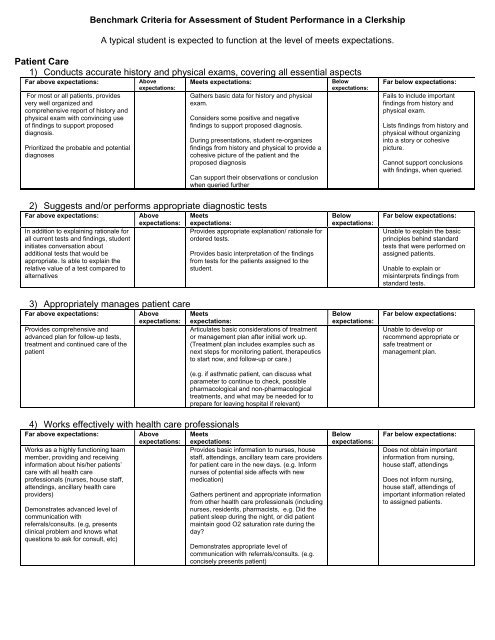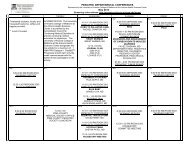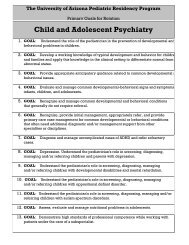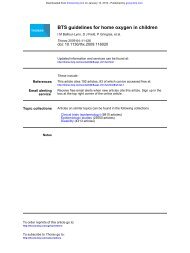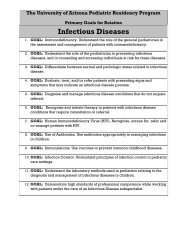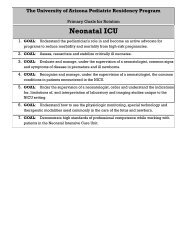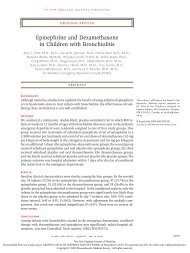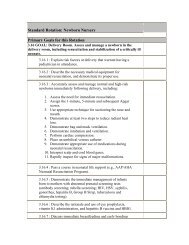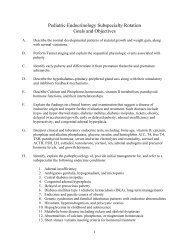Patient Care 1) Conducts accurate history and physical exams ...
Patient Care 1) Conducts accurate history and physical exams ...
Patient Care 1) Conducts accurate history and physical exams ...
Create successful ePaper yourself
Turn your PDF publications into a flip-book with our unique Google optimized e-Paper software.
Benchmark Criteria for Assessment of Student Performance in a Clerkship<br />
A typical student is expected to function at the level of meets expectations.<br />
<strong>Patient</strong> <strong>Care</strong><br />
1) <strong>Conducts</strong> <strong>accurate</strong> <strong>history</strong> <strong>and</strong> <strong>physical</strong> <strong>exams</strong>, covering all essential aspects<br />
Far above expectations:<br />
For most or all patients, provides<br />
very well organized <strong>and</strong><br />
comprehensive report of <strong>history</strong> <strong>and</strong><br />
<strong>physical</strong> exam with convincing use<br />
of findings to support proposed<br />
diagnosis.<br />
Prioritized the probable <strong>and</strong> potential<br />
diagnoses<br />
Above<br />
expectations:<br />
Meets expectations:<br />
Gathers basic data for <strong>history</strong> <strong>and</strong> <strong>physical</strong><br />
exam.<br />
Considers some positive <strong>and</strong> negative<br />
findings to support proposed diagnosis.<br />
During presentations, student re-organizes<br />
findings from <strong>history</strong> <strong>and</strong> <strong>physical</strong> to provide a<br />
cohesive picture of the patient <strong>and</strong> the<br />
proposed diagnosis<br />
Can support their observations or conclusion<br />
when queried further<br />
Below<br />
expectations:<br />
Far below expectations:<br />
Fails to include important<br />
findings from <strong>history</strong> <strong>and</strong><br />
<strong>physical</strong> exam.<br />
Lists findings from <strong>history</strong> <strong>and</strong><br />
<strong>physical</strong> without organizing<br />
into a story or cohesive<br />
picture.<br />
Cannot support conclusions<br />
with findings, when queried.<br />
2) Suggests <strong>and</strong>/or performs appropriate diagnostic tests<br />
Far above expectations:<br />
In addition to explaining rationale for<br />
all current tests <strong>and</strong> findings, student<br />
initiates conversation about<br />
additional tests that would be<br />
appropriate. Is able to explain the<br />
relative value of a test compared to<br />
alternatives<br />
Above<br />
expectations:<br />
3) Appropriately manages patient care<br />
Far above expectations:<br />
Provides comprehensive <strong>and</strong><br />
advanced plan for follow-up tests,<br />
treatment <strong>and</strong> continued care of the<br />
patient<br />
Above<br />
expectations:<br />
Meets<br />
expectations:<br />
Provides appropriate explanation/ rationale for<br />
ordered tests.<br />
Provides basic interpretation of the findings<br />
from tests for the patients assigned to the<br />
student.<br />
Meets<br />
expectations:<br />
Articulates basic considerations of treatment<br />
or management plan after initial work up.<br />
(Treatment plan includes examples such as<br />
next steps for monitoring patient, therapeutics<br />
to start now, <strong>and</strong> follow-up or care.)<br />
(e.g. if asthmatic patient, can discuss what<br />
parameter to continue to check, possible<br />
pharmacological <strong>and</strong> non-pharmacological<br />
treatments, <strong>and</strong> what may be needed for to<br />
prepare for leaving hospital if relevant)<br />
Below<br />
expectations:<br />
Below<br />
expectations:<br />
Far below expectations:<br />
Unable to explain the basic<br />
principles behind st<strong>and</strong>ard<br />
tests that were performed on<br />
assigned patients.<br />
Unable to explain or<br />
misinterprets findings from<br />
st<strong>and</strong>ard tests.<br />
Far below expectations:<br />
Unable to develop or<br />
recommend appropriate or<br />
safe treatment or<br />
management plan.<br />
4) Works effectively with health care professionals<br />
Far above expectations:<br />
Works as a highly functioning team<br />
member, providing <strong>and</strong> receiving<br />
information about his/her patients’<br />
care with all health care<br />
professionals (nurses, house staff,<br />
attendings, ancillary health care<br />
providers)<br />
Demonstrates advanced level of<br />
communication with<br />
referrals/consults. (e.g, presents<br />
clinical problem <strong>and</strong> knows what<br />
questions to ask for consult, etc)<br />
Above<br />
expectations:<br />
Meets<br />
expectations:<br />
Provides basic information to nurses, house<br />
staff, attendings, ancillary team care providers<br />
for patient care in the new days. (e.g. Inform<br />
nurses of potential side affects with new<br />
medication)<br />
Gathers pertinent <strong>and</strong> appropriate information<br />
from other health care professionals (including<br />
nurses, residents, pharmacists, e.g. Did the<br />
patient sleep during the night, or did patient<br />
maintain good O2 saturation rate during the<br />
day?<br />
Demonstrates appropriate level of<br />
communication with referrals/consults. (e.g.<br />
concisely presents patient)<br />
Below<br />
expectations:<br />
Far below expectations:<br />
Does not obtain important<br />
information from nursing,<br />
house staff, attendings<br />
Does not inform nursing,<br />
house staff, attendings of<br />
important information related<br />
to assigned patients.
Professionalism<br />
1) Demonstrates punctuality, accountability, honesty<br />
Far above expectations:<br />
Assists team or others to prepare in<br />
advance<br />
Assists team or others in starting on<br />
time, completing task on time, <strong>and</strong><br />
being accountable for the work<br />
completed.<br />
Above<br />
expectations:<br />
Meets<br />
expectations:<br />
Student arrives on time for all activities.<br />
Student has prepared in advance for<br />
appropriate activities.<br />
Student obtains appropriate approval for<br />
necessary absence or late arrival.<br />
Student informs appropriate supervisors <strong>and</strong><br />
colleagues when absent or late.<br />
Below<br />
expectations:<br />
Far below expectations:<br />
Student is late on several<br />
occasions without approval or<br />
informing supervisors.<br />
Student does not arrange to<br />
complete tasks when absent.<br />
Student is not prepared for<br />
meeting or task.<br />
Student arranges for work to be completed<br />
regardless of absence or tardiness.<br />
2) Actively seeks responsibility beyond the scope of expectations<br />
Far above expectations:<br />
Student consistently asks others<br />
how s/he can be helpful.<br />
Student consistently offers to spend<br />
extra time or extra work than the<br />
amount that was asked or expected.<br />
Above<br />
expectations:<br />
Meets<br />
expectations:<br />
Student sometimes asks others how s/he can<br />
be helpful when not prompted.<br />
Student sometimes offers to spend extra time<br />
or extra work than the amount that the amount<br />
that was asked or expected.<br />
Below<br />
expectations:<br />
Far below expectations:<br />
Student is not meeting <strong>and</strong><br />
must be reminded of the<br />
minimal expectations.<br />
Student refuses to commit<br />
extra time or work even when<br />
asked by a patient, colleague<br />
or supervisor.<br />
3) Demonstrates sensitivity <strong>and</strong> responsiveness to diversity, including culture, ethnicity <strong>and</strong> income.<br />
Far above expectations:<br />
Demonstrates advocacy for his/her<br />
patients by implementing strategies<br />
to overcome cultural, ethnic or<br />
economic barriers to his/her<br />
patient’s care, such as providing<br />
information or resources for<br />
transportation, obtaining interpreter,<br />
<strong>and</strong>/or revising treatment for<br />
religious, cultural beliefs.<br />
Consistently addresses these issues<br />
as part of the social <strong>history</strong> of all<br />
patients.<br />
Above<br />
expectations:<br />
Meets<br />
expectations:<br />
Demonstrates awareness of economic status<br />
<strong>and</strong> cultural <strong>and</strong>/or ethnic factors that may<br />
affect a patient’s timeliness willingness to<br />
accept a treatment, compliance with a<br />
treatment program, etc.<br />
Recognizes a patient’s stated beliefs when<br />
explaining care or suggesting treatment.<br />
Routinely documents the ethnicity of patients<br />
in written <strong>and</strong> oral presentations.<br />
Below<br />
expectations:<br />
Far below expectations:<br />
Demonstrates irritation or<br />
rudeness to a patient who has<br />
expressed beliefs contrary to<br />
medical model.<br />
Fails to consider effects of<br />
patient’s personal life factors<br />
that affect timeliness,<br />
compliance, etc.<br />
Suggests a treatment<br />
approach that conflicts with a<br />
patients’ stated beliefs.<br />
4) Demonstrates respect for:<br />
Far above expectations:<br />
Student goes out of their way to<br />
explicitly demonstrate respect to<br />
others (e.g. tells staff how s/he<br />
appreciates their assistance;<br />
compliments others on the task they<br />
accomplish).<br />
Above<br />
expectations:<br />
Meets<br />
expectations:<br />
Acknowledges the effort <strong>and</strong> values of other’s<br />
contributions.<br />
Pays attention while others are talking <strong>and</strong><br />
allows others to speak without interruption.<br />
Speaks respectfully to others.<br />
Displays appropriate body language.<br />
Below<br />
expectations:<br />
Far below expectations:<br />
Does not acknowledge the<br />
effort <strong>and</strong> values of others<br />
contributions, by exhibiting a<br />
dem<strong>and</strong>ing attitude or<br />
impatience with others<br />
Frequently interrupts <strong>and</strong> acts<br />
as if s/he does not have time<br />
to wait for answer.<br />
Speaks rudely or<br />
inappropriately to others.
Interpersonal & Communication Skills<br />
1) Creates <strong>and</strong> sustains a therapeutically <strong>and</strong> ethically sound relationship with patients <strong>and</strong> families<br />
Far above expectations:<br />
Verifies underst<strong>and</strong>ing of patient’s<br />
message by summarizing or restating it<br />
to the patient.<br />
Above<br />
expectations:<br />
Meets<br />
expectations:<br />
Uses terminology that can be<br />
understood by patients <strong>and</strong><br />
families.<br />
Below<br />
expectations:<br />
Far below expectations:<br />
Uses medical jargon<br />
inappropriately (e.g. patient <strong>and</strong><br />
family do not underst<strong>and</strong>).<br />
Provides patient/family with clear<br />
instructions <strong>and</strong> clear explanations<br />
for tests <strong>and</strong> procedures ordered.<br />
Fails to answer question posed<br />
by patient <strong>and</strong> families.<br />
2) Clearly documents & presents patient data <strong>and</strong> clinical information<br />
Far above expectations:<br />
Written <strong>and</strong> verbal reports of findings,<br />
research, <strong>and</strong> patient presentations are<br />
<strong>accurate</strong> <strong>and</strong> complete to the extent that<br />
they do not need any editing, revisions.<br />
Above<br />
expectations:<br />
Meets<br />
expectations:<br />
Provides sufficient <strong>and</strong> organized<br />
presentation of patient findings at<br />
rounds, team meeting, etc.<br />
Organizes written notes that clearly<br />
convey progress of patient <strong>and</strong><br />
development of problem. (For<br />
example, note follows SOAP/<br />
problem-oriented format).<br />
Below<br />
expectations:<br />
Far below expectations:<br />
Presentations of patient findings<br />
are incomplete <strong>and</strong>/or<br />
disorganized during rounds,<br />
team meetings.<br />
Written documentation is<br />
incomplete or disorganized.<br />
3) Demonstrates effective listening skills<br />
Far above expectations:<br />
Above<br />
expectations:<br />
Meets<br />
expectations:<br />
Encourages <strong>and</strong> addresses<br />
questions from patient/family.<br />
Below<br />
expectations:<br />
Far below expectations:<br />
Fails to ask patient <strong>and</strong> family if<br />
they have questions.<br />
Asks open-ended questions of<br />
patients <strong>and</strong> families.<br />
Listens to other patient<br />
presentations by colleagues <strong>and</strong><br />
residents, attendings <strong>and</strong> asks<br />
questions when appropriate.<br />
Uses appropriate non-verbal<br />
communication skills, such as<br />
looks person in the eyes, pays<br />
attention.<br />
Becomes distracted or inpatient<br />
when patient or family asks<br />
questions.<br />
Dismisses patient or families<br />
when they raise concerns.<br />
Does not pay attention when<br />
other colleagues, health care<br />
professionals are speaking (e.g.<br />
occupied with iPhone, computer<br />
or other conversation).
Practice-based Learning Improvement<br />
1) Exhibits skills of self-directed learning<br />
Far above expectations:<br />
Consistently initiates research on his/her<br />
own <strong>and</strong> conducts extensive research.<br />
Relates research back to his/her patient<br />
care <strong>and</strong> generates more research at the<br />
next level.<br />
Above<br />
expectations:<br />
Meets<br />
expectations:<br />
Defines clinical questions that<br />
he/she wants to answer, identifies<br />
areas of gaps in knowledge<br />
Demonstrates that he/she has<br />
researched information from an<br />
issue that arose in previous day or<br />
days without needing to be directly<br />
instructed<br />
Below<br />
expectations:<br />
Far below expectations:<br />
Does not research information<br />
unless directly instructed to do<br />
so.<br />
2) Uses evidence-based approaches to patient care<br />
Far above expectations:<br />
Integrates multiple sources, including<br />
primary literature, to formulate a<br />
sophisticated plan for patient<br />
management.<br />
Above<br />
expectations:<br />
Meets<br />
expectations:<br />
Accesses appropriate sources.<br />
Accesses institutional <strong>and</strong> national<br />
guidelines.<br />
Appraises <strong>and</strong> applies scientific<br />
evidence from resources to his/her<br />
approach to patients.<br />
Below<br />
expectations:<br />
Far below expectations:<br />
Does not use sources that are<br />
detailed enough for the<br />
complexity of the problem.<br />
Does not research in more depth<br />
as case unfolds.<br />
Recounts verbatim data,<br />
information from readings<br />
without being able to synthesize,<br />
critically evaluate, or apply to<br />
patient care.<br />
3) Appropriately self- assesses <strong>and</strong> incorporates feedback to improve performance<br />
Far above expectations:<br />
Above<br />
expectations:<br />
Meets expectations:<br />
Below<br />
expectations:<br />
Far below expectations:<br />
Demonstrates considerable effort <strong>and</strong><br />
extraordinary sincerity to improve in<br />
response to subtle suggestions.<br />
Integrates feedback from multiple<br />
sources (e.g. links verbal suggestion<br />
from attending with researched topic<br />
with comment from patient to change<br />
response).<br />
Verbalizes areas for personal<br />
improvement.<br />
Shows some areas of progressive<br />
improvement throughout rotation .<br />
Does not verbalize areas for<br />
personal improvement, <strong>and</strong> fails<br />
to recognize mistakes or<br />
inadequate performance.<br />
Repeats mistakes that were<br />
brought to his/her attention.
Systems-based Practice<br />
1) Advocates for quality patient care <strong>and</strong> access<br />
Far above expectations:<br />
Acts to ensure access to care. Works<br />
with others to remove/diminish an<br />
obstacle to access.<br />
Works with other health care<br />
professionals or patient to improve<br />
quality of care.<br />
Above<br />
expectations:<br />
Meets<br />
expectations:<br />
Inquires about or mentions<br />
obstacles to access to care.<br />
Recognizes when access to care is<br />
difficult <strong>and</strong> needs to be addressed<br />
Provides instructions or plan for<br />
follow up care that address<br />
additional efforts to provide high<br />
st<strong>and</strong>ard of care.<br />
Below<br />
expectations:<br />
Far below expectations:<br />
Fails to recognize an obvious<br />
instance of poor access to care.<br />
Fails to mention a need for<br />
improved quality patient care<br />
when an instance of insufficient<br />
care occurs with his/her patient.<br />
2) Knows <strong>and</strong> works appropriately within delivery systems, health costs<br />
Far above expectations:<br />
Talks to <strong>and</strong> helps to establish follow-up<br />
care with health care professional other<br />
than MD <strong>and</strong>/or with consultant..<br />
Able to discuss with patient alternative<br />
approaches based on costs.<br />
Above<br />
expectations:<br />
Meets<br />
expectations:<br />
Demonstrates that s/he knows the<br />
distinct role of various non-MD<br />
health care professionals, as well<br />
as role of consultants.<br />
Mentions cost of different<br />
approaches <strong>and</strong> includes<br />
alternative follow-up plan to<br />
consider cost when appropriate.<br />
Below<br />
expectations:<br />
Far below expectations:<br />
Fails to mention or ask about<br />
consultant(s) for follow-u with<br />
health care professionals other<br />
than MD.<br />
Provides follow-up plans that are<br />
unrealistic with regard to cost or<br />
availability for the specific clinical<br />
situation.<br />
3) Knows the role of MD in community health & prevention <strong>and</strong> applies to patient care<br />
Far above expectations:<br />
Demonstrates knowledge of or<br />
involvement in specific public health<br />
initiates or community health <strong>and</strong><br />
prevention programs.<br />
Applies his/her experience in public<br />
health <strong>and</strong> community prevention<br />
programs to the follow-up plans with<br />
his/her own patient(s).<br />
Above<br />
expectations:<br />
Meets<br />
expectations:<br />
Mentions role of MD to gather<br />
personal data about practice to<br />
contribute to larger underst<strong>and</strong>ing<br />
of medical practice as a field, when<br />
appropriate.<br />
Mentions role of MD for issues in<br />
public health <strong>and</strong> community<br />
prevention of diseases when<br />
appropriate.<br />
Below<br />
expectations:<br />
Far below expectations:<br />
Fails to recognize when a<br />
community health prevention<br />
issue is relevant to his/her<br />
patient.<br />
Fails to recognize or mention<br />
role of MD in community health<br />
<strong>and</strong> prevention. (e.,g Does not<br />
underst<strong>and</strong> the role of MD in<br />
diagnosing <strong>and</strong> treating HIV<br />
positive patients as it contributes<br />
to population health<br />
improvement)<br />
4) Applies knowledge of disease prevalence/incidence to the clinical care of patients.<br />
Far above expectations:<br />
Includes reference to<br />
prevalence/incidence in explanations to<br />
individual patients about their diagnosis<br />
<strong>and</strong>/or follow-up plan, as appropriate<br />
Above<br />
expectations:<br />
Meets<br />
expectations:<br />
In patient presentations <strong>and</strong><br />
discussions, prioritizes differential<br />
diagnosis in relation to prevalence<br />
<strong>and</strong> incidence of diseases.<br />
Below<br />
expectations:<br />
Far below expectations:<br />
Fails to mention or recognize<br />
importance of<br />
prevalence/incidence of<br />
diseases in discussing individual<br />
patient care.


